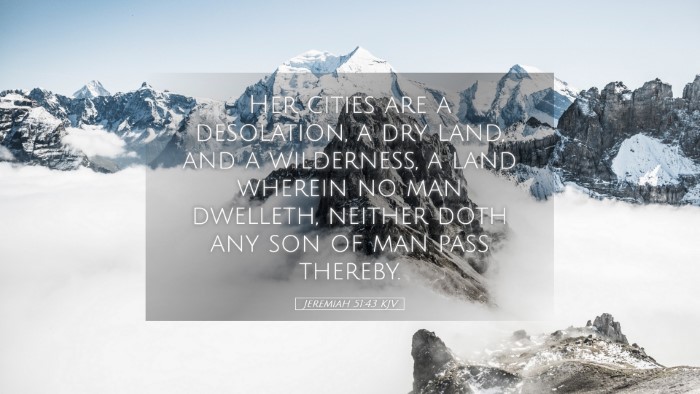Commentary on Jeremiah 51:43
Verse Context: Jeremiah 51:43 states, "Her cities are a desolation, a dry land, and a wilderness, a land wherein no man dwelleth, neither doth any son of man pass thereby." This verse is part of the larger theme of God's judgment against Babylon and the resulting desolation that would befall the nation.
Historical Context
Overview of Babylon’s Fall: Babylon was once a prominent and powerful empire, renowned for its wealth and splendor. However, God's pronouncement of judgment, as delivered through the prophet Jeremiah, foretold its complete and utter destruction. The biblical narrative details how the pride and idolatry of Babylon set the stage for God's wrath.
Significance of Desolation: The imagery of desolation signifies not only physical devastation but also spiritual abandonment. This reflects the consequences of straying from God’s statutes and highlights the ultimate futility of human pride against divine sovereignty.
Commentary Insights
Matthew Henry’s Perspective
Matthew Henry emphasizes the starkness of Babylon's judgment. He notes that the cities, once bustling with life and activity, would become uninhabitable ruins. This desolation is not merely poetic but denotes a literal fulfillment of God's word, serving as a warning against arrogance and moral depravity.
- The Metaphor of Desolation: Henry points out that desolation serves as a metaphor for spiritual barrenness which arises when God withdraws His presence.
- Symbol of Judgment: He considers this condition of desolation as emblematic of God’s retributive justice against nations that reject His authority and pursue evil.
Albert Barnes’ Commentary
Albert Barnes adds depth to understanding Jeremiah 51:43 by drawing attention to the historical fulfillment of God’s prophecy against Babylon. His analysis reveals that the desolate state of the cities reflects God’s ultimate triumph over human opposition.
- Physical and Spiritual Implications: Barnes articulates that Babylon’s transformation into a wasteland signifies not just a physical overthrow but also the spiritual defeat of a civilization built on idolatry.
- Call to Reflection: He encourages readers to reflect on the transient nature of earthly kingdoms in light of God’s eternal reign, prompting a commitment to faithfulness.
Adam Clarke’s Interpretation
Adam Clarke provides a detailed exploration of the terms used in this verse. He emphasizes the significance of “a dry land” as indicative of abandonment, where no life can sustain itself, thus representing God’s judgment on evil nations.
- Prophetic Fulfillment: Clarke underscores that Jeremiah’s pronouncement of desolation is both a specific prophecy and a general principle about the fate of wicked nations across history.
- Implications for Today: His insights elucidate the importance of nations recognizing their moral and spiritual bearings, lest they follow in the footsteps of Babylon.
Theological Reflections
The Sovereignty of God: The combined insights from the commentaries illustrate the overarching theme of God’s sovereignty. Babylon’s eventual desolation stands as a testament to God's control over empires and His ability to bring judgment upon those who oppose His will.
The Conditionality of God’s Blessings: The verse serves as a cautionary tale highlighting that divine blessings are not unconditional; they depend on nations remaining faithful to God’s commandments. In the case of Babylon, their abandonment of righteousness led to their downfall.
Application For Ministry
Pastoral Counsel: For pastors and church leaders, the desolation of Babylon serves as an urgent reminder to shepherd their congregations with diligence, guiding them towards a faith that values righteousness and seeks God's presence.
Educational Perspective: The historical and theological insights drawn from Jeremiah 51:43 can aid students and scholars in examining the dynamics between divine justice and human agency, leading to a deeper understanding of Scripture.
Conclusion
The desolation of Babylon as expressed in Jeremiah 51:43 holds profound lessons for individuals and nations alike. The combined commentary insights provide a multifaceted view of the importance of spiritual fidelity, the dangers of moral decay, and the comforting assurance of God’s ultimate sovereignty. It serves as both a warning and a call to action for those who seek to remain true to God amidst a world that often strays from His truths.


